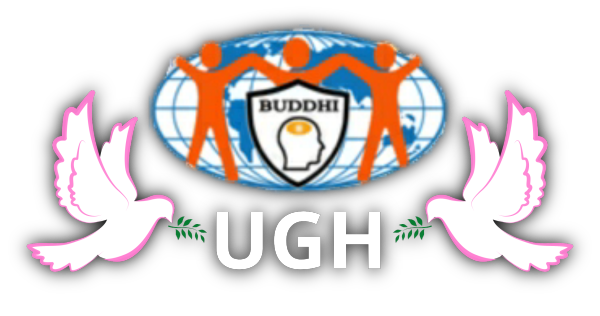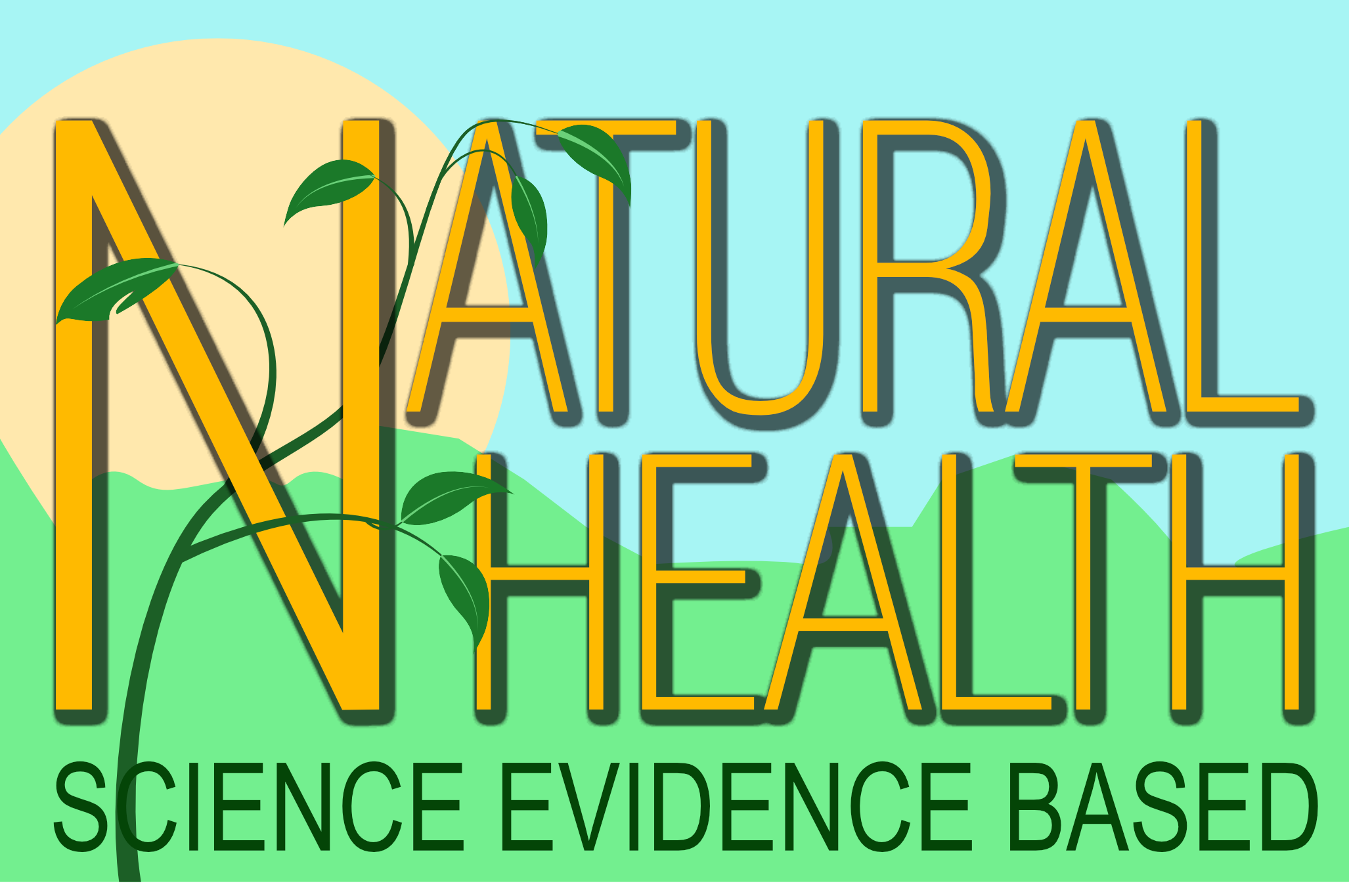Infodemic
UGH article, 2020
Author: D. Dashwood

The rise of the (mis)information society
Introduction

The 2019-20 outbreak of the covid-19 coronavirus disease proved to be the dealiest pandemic both, socially and
economically, since the 1918-19 H1N1 influenza - 'Spanish Flu' - outbreak. It has also
proved to be one of the costliest in regards to the spread of misinformation.
The huge amount of information that became available almost overnight, much of which was misleading of completely false, from trusted sources and
those that purported to be 'trustworthy', made it difficult for people to find reliable sources and trustworthy information when they needed it
There are many reported cases of people dieing from the effects of covid-19 because they have rejected 'main stream' medical advice and instead believed in information sourced from untrustworthy, fake, or dishonest sources.
The World Health Organisation has been credited with originating the word 'infodemic' as it struggled to counter the untruths, misinformation, and conflicting evidence surrounding the newly emerging virus. The term 'infodemic' is listed in one dictionary to mean:
'An excessive amount of information concerning a problem such that the solution is made more difficult'.
The Oxford English Dictionary states:
"A proliferation of diverse, often unsubstantiated information relating to a crisis, controversy, or event, which disseminates rapidly and
uncontrollably through news, online, and social media, and is regarded as intensifying public speculation or anxiety."
Infodemics are not a new phenomonon although the name is. Throughout history the spread of rumour and misinformation plagued many societies in times of great
crisis and used as weapons in times of war. In wartime the psychological state of the population has a positive or negative effect on the
conduct, prosecution, and possible outcome of the conflict.
Governments, regimes and their leaders use the psychology of rumour and misinformation to both boost moral and resolve in their own populace whilst
attempting to sow doubt, despondency and dispair in the minds of the enemy population.
Beware, information bias ahead
There is one immutable fact. We are all subjects of and to bias.
Everyone has biases. It’s true. Having a bias doesn’t make you a bad person, however, and not every bias is negative or hurtful. It’s not recognizing biases that can lead to bad decisions at work, in life, and in relationships
Although people have both explicit and implicit biases, the implicit ones are the most concerning because they are the ones we don’t recognize we have.
What Is Implicit Bias?
The term implicit bias was first coined in 1995 by psychologists Mahzarin Banaji and Anthony Greenwald, where they argued that social behavior is largely influenced by unconscious associations and judgments (Greenwald & Banaji, 1995).
Specifically, implicit bias refers to attitudes or stereotypes that affect our understanding, actions, and decisions in an unconscious way, making them difficult to control.
Read more on Bias in our related article: What is Correct Information? - (opens a new browser page).
Why do people pass on information to others?
We pass on information all the time, to family, friends, etc., but here we will look at the roles of social media, the press, governmental organisations and Government.
In sociology, there has been research on the agenda-setting function of the press. The media decides what is important and will focus on that. So, two equally important news events might happen, but if the media thinks one is more important or sensational than the other, that is the one they will choose to concentrate on.
Do the authors of fake news set their agenda for what is the most important thing to them too? We can only imagine they do, or why would they spread it in the first place?
But who are these fake news writers? Popular thinking could conjure images of reclusive figures hiding in their basements, typing up conspiracy theories to share on their website, blog or (again) social media. But in reality the successful creation of fake news involves many, many people, and many of those people may not even realise they part of it.
Fake news is harmful

Fake news is harmful. It can spread untruths about events, people and situations. It can target certain groups in society who may be vulnerable, such as people with mental health problems. It can discriminate and cause hatred against certain groups. “Pizzagate” is a prime example of how fake news can have very serious consequences.
In 2016, an American man opened fire at a pizza restaurant in Washington after hearing fake news reports from emails stolen from the account of John Podesta, Campaign Manager to Hilary ~Clinton, that a child sex ring was being operated out of the restaurant. Clinton was then running for US President. Luckily, no one was harmed. Before the attack, the man tried to encourage friends to accompany him.
Also in 2016, during that US Presidential election, Vox found that the top 20 fake news reports actually outperformed real news in terms of readership.
So what does all this have to do with sociology?
Firstly, the spreading of fake news encourages hatred, misunderstanding, discrimination,
prejudice and harm against certain people, groups and events. It may also spread love, joy and understanding, but this is unlikely as the nature of
fake news is to cause intentional harm.
Secondly, we said earlier about the agenda setting function of the press. Fake news writers may also have
an agenda setting function, spreading rumours and lies about something they feel strongly about. This can cause confusion and misinformation about
the real news.
Thirdly, people may not always know what is real and what is fake. This can cause upset and misunderstanding.
Fourthly, and perhaps most importantly, with all this fake news, do real news stories and real social issues become
lost as a result of sensationalist information?
Conspiracy theory and misinformation
Welcome to the paranoid, topsy-turvy world of the conspiracy theory where anything is possible. There is often little evidence to support the claims and no proveable factual evidence that conspiracy claims are true, as in the case of 'alien abduction', but to some people that very lack of evidence is, in itself, clear evidence of a cover up.
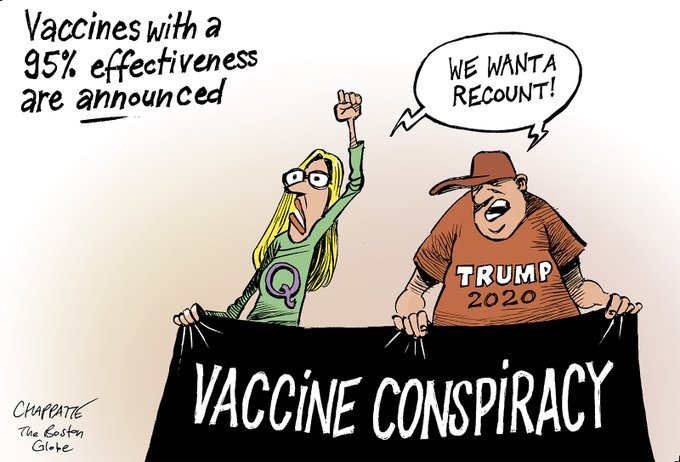
© Patrick Chappatte/The Boston Globe
Look back at almost any major world event and there is certainly at least one conspiracy theory to explain it. The list is almost endless; some of the most cited conspiracy theories are, for example, that the Apollo moon landings were faked, the 9/11 terror attacks were an inside job, climate change is a hoax, President John F. Kennedy was assassinated by the CIA, the pharmaceutical industry is suppressing a cure for cancer, vaccines cause autism, Princess Diana was murdered by the British Royal Family, the world is ruled by lizards, and the earth is flat.
What! The earth is flat?
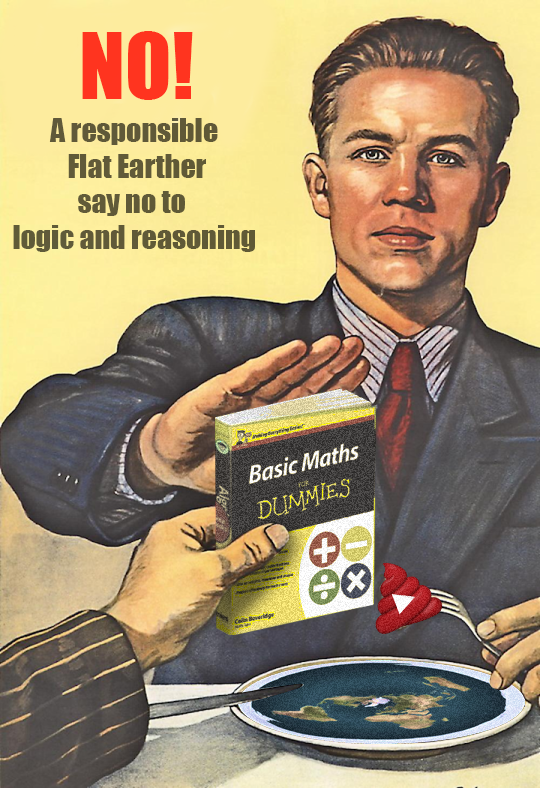
The following is from the Flat Earth Society Wiki
The Flat Earth Society has dedicated itself to starting science afresh from the ground up, to begin to see the world without bias and assumption. Experiment and experience has shown that the earth is decidedly flat. Time and time again through test, trial, and experiment, it has been shown that the earth is not a whirling globe of popular credulity, but an extended plane of times immaterial.
The 'flat earthers' are the epitomy of biased thinking; their belief in a flat earth flies in the face of established science fact. They honestly believe that all established scientific evidence is nothing but an elaborate hoax perpetrated on the general population by Governments, Agencies such as NASA, big business, and Scientists.
Now, I don't propose we waste time on the utterly pointless task of telling 'flat earthers' that they are wrong; they will just not accept anything that disproves their view as proof and will counter any argument with more unverifiable 'facts' or indulge in pseudoscience gibberish. Instead I will point to them as just one example of the propogators of misinformation.
Conspiracy theory or conspiracy hypothesis?
Many "conspiracy theories" should be perhaps more correctly called "conspiracy hypotheses" and often concern matters of science or medicine, although my favourite conspiracy theory is that the world's major economies are actually run by a secret organisation named the Illuminati.
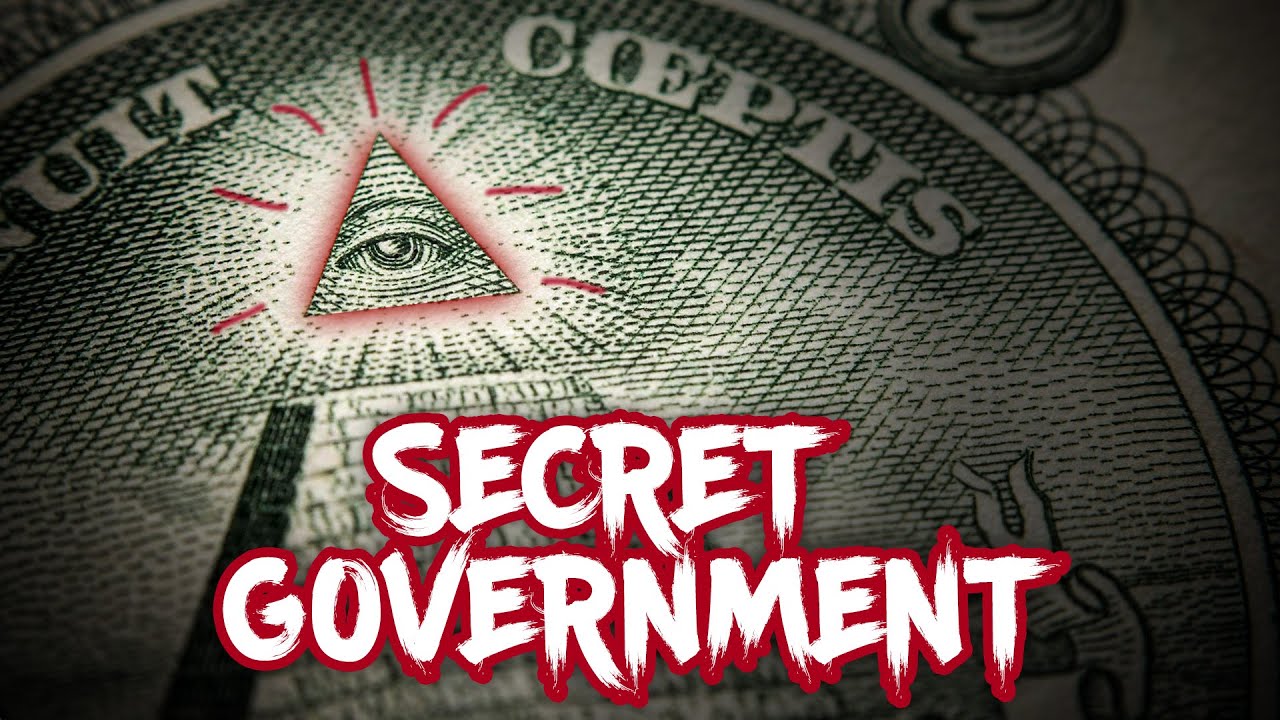
Conspiracy theorists have a very low standard of evidence for what they want to believe but an impossibly high standard of evidence for what they don’t want to believe
Conspiracy theorists have a very low standard of evidence for what they want to believe but an impossibly high standard of evidence for what they don’t want to believe.
It is easy to dismiss conspiracy theories as unreasonable beliefs held by a small number of paranoid idiots, but that seriously underestimates the true scale, diversity and number of believers because belief in conspiracy theories is extensive; it is the product of human psychology and extremely influential, it is also very dangerous.
There is a popular belief that conspiracy theory is more widespread among the less-educated, but is by no means confined only to that section of society. Educated people are also susceptible if a particular conspiracy theory fits with their world view.
The theories are also endorsed across the ideological spectrum. They are literally left, right and centre. More conservatives than liberals believe in Democrat vorter fraud – promulgated by Donald Trump – but many liberals believe that the 9/11 attacks was a government plot to drum up support for invading Iraq.
Why do so many people believe in conspiracy theories? One reason, say psychologists, is that it is perfectly reasonable, because conspiracies sometimes do happen. Consider the Iran-Contra affair in the 1980s, when senior US officials conspired to sell weapons to Iran – then under an arms embargo – and channel the proceeds to rebels trying to oust Nicaragua’s socialist government.
Psychologists also believe that conspiracy theories mirror how we intuitively understand the world and events in it. The human brain did not evolve to process complex information about global politics, economics or science. It evolved to allow early humans to survive where threats and dangers conspired against them and were a constant reality; being suspicious and wary of the unknown helped them to stay alive. So it may be that the 'conspiratorial mindset' aided survival.
Under those circumstances it was pehaps safer to assume that unseen threats lurked everywhere, that "unknown groups" had malign intent, or that unforseen and otherwise unexplainable events were causally related. The cost of holding these assumptions were minimal, but the cost of not holding them was often death.
Bias, we all have them
Earlier we looked at explicit and implicit bias and said that implicit bias is not so good because we don't recognise that we have them. Having an explicit bias can be good or bad depending on how we use that bias; for example I may have a bias towards a particular brand of soap because I have used it and found it to be OK, so nothing wrong with that; however if I have a bias against something purely on the basis of propoganda, hearsay, gossip, misinformation or lies then we should consider that a bad thing.
Our brains have other cognitive biases that make us susceptible to conspiracy theories. One is proportionality bias, a belief that major events have major causes. Intentionality bias makes us assume that events are planned by somebody or something. Confirmation bias, that has a large part to pay in conspiracy theory, means that we seek out evidence supporting our beliefs.
Conspiracy theories can also be emotionally reassuring. They provide truthful-sounding explanations for events that otherwise seem inexplicable, random or fickle. They can also give believers a pleasing sense of superiority because they, and sometimes they alone, have seen through the lies and cover-ups to reveal the "truth".
Personality type also plays a part. People who are naturally suspicious, for whatever reason, of received wisdom, and often of authority, are more likely to believe in the existence of cover-up and conspiracy as I pointed out earlier with the 'flat earthers'.
"You believe what? That's preposterous." "OK, prove it!"
Conspiracy theories are often utterly preposterous and totally lacking in credible evidence, but at the same time they are almost impossible to disprove, at least in the minds of believers; take for example the case of David Icke, an English conspiracy theorist who believes that a genetically modified human–Archon hybrid race of shape-shifting reptilians known as the Babylonian Brotherhood, the Illuminati, or the "elite", manipulate global events to help keep humans in constant fear.
No amount of counter-evidence can refute them, and in fact this evidence often reinforces them because it can be dismissed by the believers as part of the conspiracy.
In this respect conspiracy theories have much in common with pseudoscience, that superficially resembles credible science but lacks its crucial epistemological feature, falsifiability, that means a hypothesis must be structured in a way that they it can be disproved by new evidence.
The suspicious conspiratorial mindset of early humans may have been an asset in the past, but is now a liability. When it comes to dealing with important issues such as climate change or the cause of covid-19, conspiracy theories are a major obstacle to reasoned debate and evidence-based action.
Locking the stable door .....
Our interconnected world and our almost limitless access to limitless information, both true and false, is at the core of the World Wide Web and the fundamentsl nature of the internet; it is also, I believe, at the very heart of some of the major problems in society today.
One of the really big problems is the almost instant dissemination of information through mainstream media and social media channels.
So, why is this a problem?
You may excuse me if I use an often repeated analogy here, "there is no point in locking the stable door once the horse has bolted". As soon as information beit good, bad, indifferent truthfull or lie, is posted to the internet, social media or other media sources it is impossible to stop its spread, exactly like the pandemic actually.
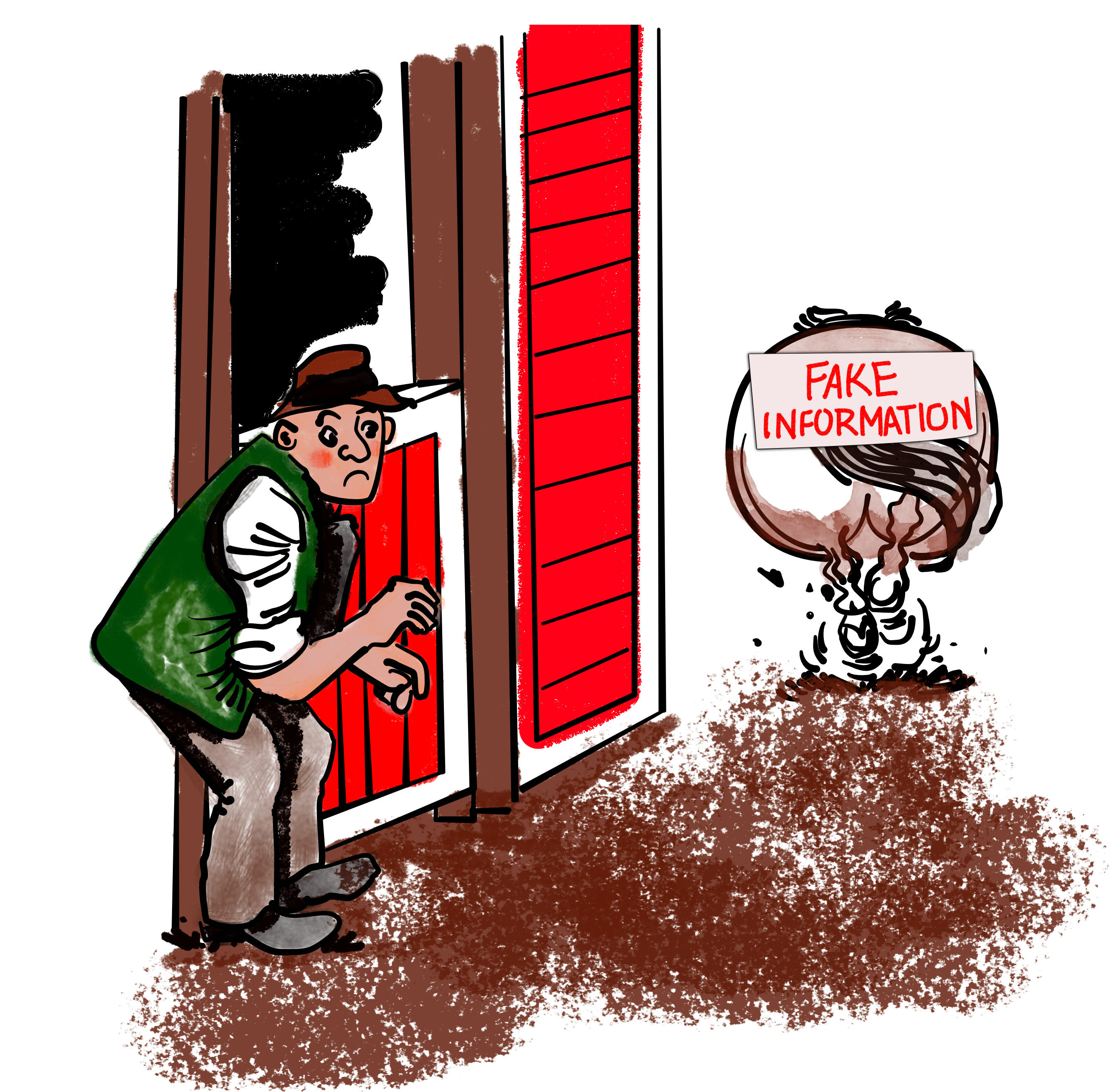
"Locking the stable door is no good if the horse has gone"
Provided that the information is correct, honest and truthful, for example getting information on how to keep safe during a pandemic from the UK National Health Service, then the internet and social media is a force for good.
Where the information is disreputable, dishonest and untruthful (as is often in the case of the Trump administration) such information becomes a great evil that may ultimately cost people their lives.
After Sir Tim Berners-Lee developed the concept of the World Wide Web connecting the internet, the concept of freely accessible instant access to open information took root; however none foresaw the issues that would arise as the result of free access to the internet and the ability of the individual to 'post' whatever information they choose to it.
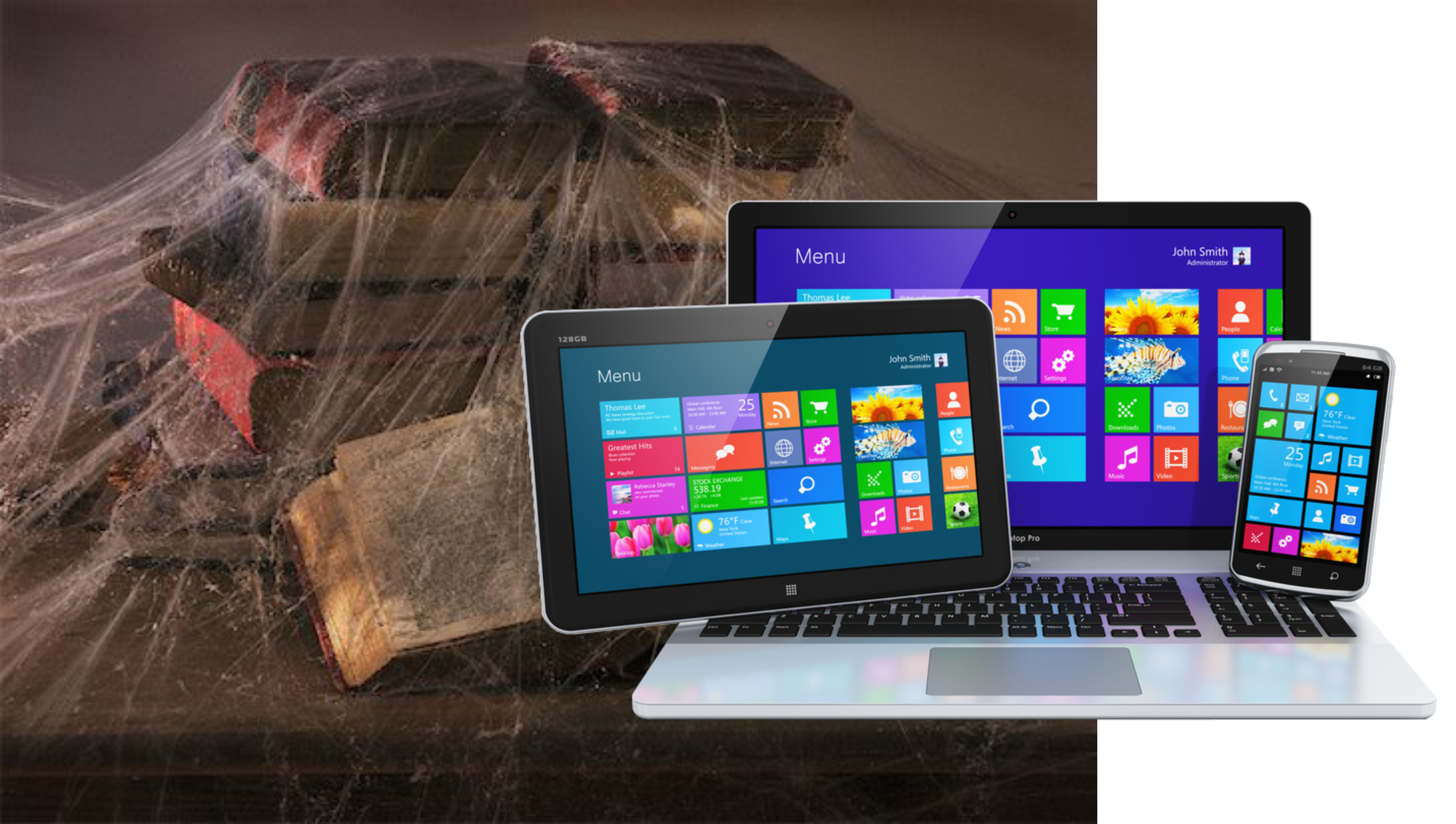
As has been the case with almost all inventions throughout history, the intentions of the inventor for its use, if any, have often been sidelined. Individual, organisations, corporations, big business, and Governments have then used or manipulated the invention for their own purposes. The main problem is when that use is to cause harm, take money from others, or coerce and control.
The very concept of free access to the internet is liberating for some but restricting for others, if you will the Yin and Yang duality of information sharing.
UGH Comment:
At UGH we urge you to remain open minded when listening, reading and taking in information but at the same time remain skeptical.
Utilise your innate ability to view things as they are while remaining alert to danger, the danger that can come from false, innacurate mis-information.
Use your Buddhi to help you to distinguish good from bad and true from false.
Never take the validity or voracity of information without question. Check out the source of your infomation and research whether your trusted sources have
the same information.
Be skeptical of 'sensationalist' media headlines
Be a well infomed skeptical thinker, not a misinformed conspiracy theorist.
Help to stop the spread of misinformation by taking a time-out before sharing or re-posting doubtful information on social media. If you cannot verify the validity and voracity of information or you have any doubts about it DO NOT share it or re-post.
Links
- The Flat Earth Society: theflatearthsociety.org
- Simply Psychology: Implicit Bias
